We may not have the course you’re looking for. If you enquire or give us a call on 01344203999 and speak to our training experts, we may still be able to help with your training requirements.
Training Outcomes Within Your Budget!
We ensure quality, budget-alignment, and timely delivery by our expert instructors.

As a Mortgage Broker, you'll have the rewarding task of assisting individuals and businesses in securing loans to purchase their dream homes or investment properties.There are several perks that comes along with becoming a Mortgage Broker. You can help first time buyers to secure their dream home.
From finding deals at better prices to helping older people release equity from their homes, becoming a Mortage Broker is a rewarding experience. You can also learn a lot about people’s finances, their economic conditions, their needs and requirements and then provide them help as pertheir needs. While the prospect of becoming a Mortgage Broker does entice people, they are often left wondering “How to Become a Mortgage Broker in the first place?”
According to Statista, as of 2021, there were over 1.2 million Mortgage Sales in the UK, where first time buyers, home movers, and remortgagors contributing to the sales.In this blog, you are going to learn about How to Become a Mortgage Broker, the qualifications required and more.
Table of Contents
1) Who is a Mortgage Broker?
2) What does a Mortgage Broker do?
3) Difference between a Mortgage Adviser and a Mortgage Broker?
4) What are the requirements to become a Mortgage Broker?
5) How much does a Mortgage Adviser earn?
6) What are the benefits of becoming a Mortgage Adviser ?
7) Conclusion
Who is a Mortgage Broker?
Mortgage Broker is an individual who is responsible for connecting individuals or businesses who are seeking a Mortgage loan from potential Mortgage lenders. These Mortgage Brokers understand the financial statuses of the borrowers and help them find lenders who can offer them interest rates at an affordable price.
They often act as a liaison between the two parties. Their earnings come from the origination fee that is paid by both the parties, once the agreement is finalised.
Mortgage Brokers do not use any kind of personal funds of their own. They are responsible for collecting the necessary documents from both the parties. These documents that Mortgage Advisers collect from borrowers to learn about the mortgage life cycle assist them understand the amount they require and if they qualify for the same . They then collect these documents and submit them to the lenders for processing the approval of the fund.
What does a Mortgage Broker do?
As a Mortgage Broker you are responsible for the following things:
a) Since you will act as a liaison between the lender and the borrower, it will be your responsibility to connect the right borrower to the right lender, so that there is no unnecessary loss of time.
b) You will have to be responsible for the contracts that are drafted between the parties. You need to have good amount of information regarding the methods of repayments, the terms, administrative costs and other expenditures that are required to complete the contract between the borrower and the lender.
c) As a Mortgage Broker your main aim is to understand difference between mortgage vs loan the borrower’s financial portfolio. The amount of capital they need, the interest rates that they can pay, their financial goals and other Mortgage needs.
d) As a Broker, you need to make sure that your negotiation skills are good. The borrower will not negotiate with the Mortgage amount they require or about the interest rates. All the terms of the contract, the Mortgage amount, and fees will be negotiated by you.
e) You need to take care of all legal regulations and contracts at the time of drafting the contract.
f) After both the parties have agreed to the contract, you need to take care that the closing process takes place smoothly without any delay or discrepancies.
g) You are responsible for maintaining relations between other Mortgage borrowers and lenders.
Difference between a Mortgage Adviser and a Mortgage Broker?
In the United Kingdom, the term Mortgage Broker and Adviser is used interchangeably. Both Mortgage Adviser/Broker are responsible for connecting the right Mortgage borrower with the correct lender. You, as a Mortgage Adviser, can help people or businesses get the right amount that they want to borrow by checking their eligibility. You can also help them by asking the interest rates that they are willing to pay and then bridge the gap by finding the right lender.
A Mortgage Adviser is important if anybody wants a property loan for the first time. Understanding the various schemes in the lending and borrowing business is important as it will help the borrower to improve their financial circumstances. With the financial advises from the Mortgage Advisers, it is also possible for Mortgage borrowers, to get a loan based on principle. This means that the Mortgage Adviser will let the lender know that the borrower can be allowed to get the Mortgage.
What are the requirements to become a Mortgage Broker?
If you want to become a Mortgage Broker, you’ll have to consider the following pre-requisites:
Research the Mortgage industry
To excel as a Mortgage Broker, it is crucial to have a solid understanding of the Mortgage industry and stay informed about its various aspects. Conducting thorough research will provide you with valuable insights and help you navigate the ever-evolving landscape of Mortgages effectively.
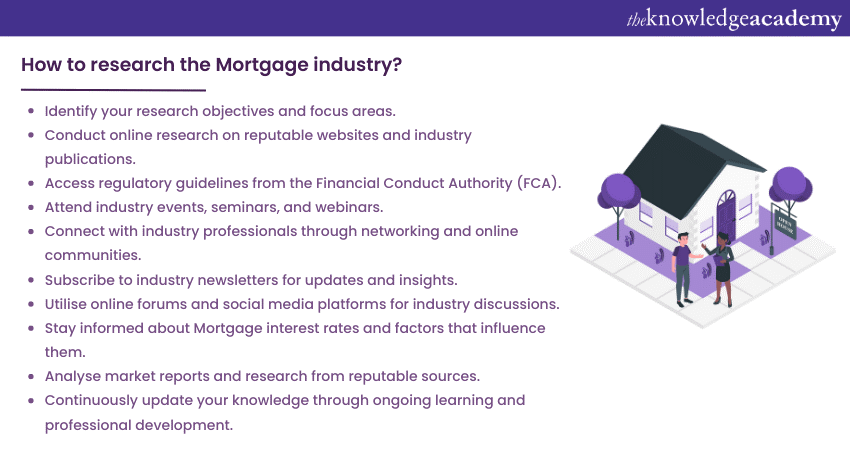
Start by familiarising yourself with the different types of Mortgage products available in the UK market. Understand the nuances of Fixed-rate Mortgages, Adjustable-rate Mortgages, Buy-to-let Mortgages, and other specialised products. Learn about the advantages, disadvantages, and eligibility criteria associated with each type of Mortgage.
Additionally, keep a close eye on interest rates and how they fluctuate. Understanding the factors that influence interest rates, such as economic conditions and monetary policies, will enable you to provide informed advise to your clients. Stay updated with current market trends and forecasts to anticipate potential shifts in the Mortgage industry.
Furthermore, it is essential to have a good grasp of the regulations and legislation governing the Mortgage sector. Familiarise yourself with the Financial Conduct Authority (FCA) guidelines and stay informed about any changes or updates. This knowledge will help you ensure compliance and provide your clients with accurate and up-to-date information.
To deepen your understanding of the Mortgage industry, consider reading industry publications, attending seminars and conferences, and connecting with experienced professionals in the field. Engage in discussions, join relevant forums, and participate in online communities to stay abreast of industry developments and gain insights from seasoned experts.
Develop strong communication and sales skills
Effective communication and sales skills are essential for success as a Mortgage Broker. Building strong relationships with clients, understanding their needs, and effectively conveying complex financial information are key aspects of the role to become a Mortgage Broker Here are some strategies to develop and enhance your communication and sales skills:
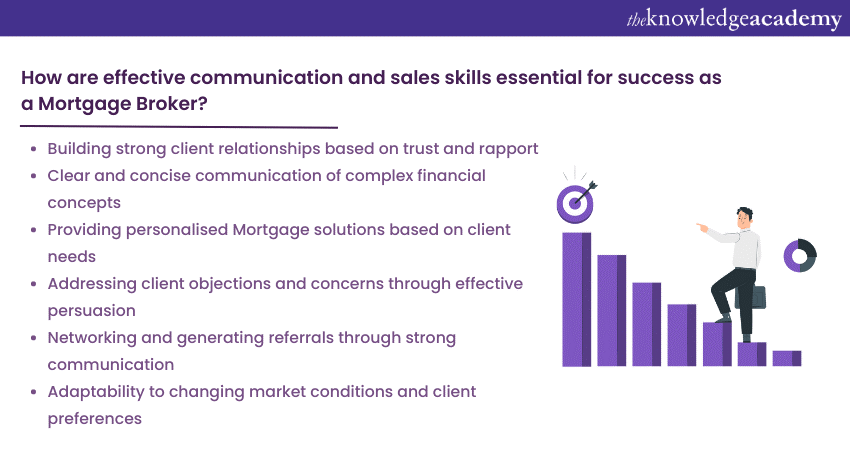
1) Active Listening: Practice Active Listening when interacting with clients. Pay close attention to their concerns, goals, and preferences. By Actively Listening, you can gain a deeper understanding of their needs and tailor your advice and solutions accordingly.
2) Clear and concise communication: Develop the ability to explain complex financial concepts in simple, easy-to-understand language. Avoid using jargon or technical terms that may confuse clients. Clearly articulate the benefits and risks associated with different Mortgage options, ensuring clients have a clear understanding of the information you are conveying.
3) Empathy and Emotional Intelligence: Cultivate empathy and Emotional Intelligence to connect with clients on a deeper level. Recognise and understand their emotions, concerns, and priorities. By showing empathy, you can build trust and establish a strong rapport with clients, making them more comfortable sharing their financial details and concerns with you.
4) Persuasive communication: As a Mortgage Broker, you will often need to persuade clients to make informed decisions. Develop persuasive communication skills to effectively present the benefits of specific Mortgage options. Highlight how the features align with the clients' needs and goals, addressing any potential objections or concerns they may have.
5) Negotiation skills: Negotiation is an integral part of the Mortgage Adviser role. Enhance your negotiation skills to secure the best terms and conditions for your clients. Understand the needs and priorities of both clients and lenders, and work towards finding mutually beneficial solutions. Effective negotiation can lead to better interest rates, loan terms, and overall outcomes for your clients.
6) Continuous sales training: Participate in sales training programs and workshops to refine your sales skills. Learn about effective sales techniques, objection handling, and relationship building strategies. Continuously improving your sales skills will help you build a robust client base and establish a successful Mortgage Brokering business.
7) Develop a professional and trustworthy image: Present yourself professionally and maintain a trustworthy image. Dress appropriately, have a professional demeanour exhibit honesty and integrity in all interactions. Clients are more likely to trust and work with Mortgage Brokers who project professionalism and reliability.
Obtain the necessary qualifications
While there are no specific educational requirements to become a Mortgage Broker in the UK, obtaining relevant qualifications can significantly enhance your knowledge and credibility in the field. It is advisable to pursue certifications that demonstrate your competence and commitment to professional excellence.
One of the most recognised qualifications for Mortgage Brokers in the UK is the Certificate in Mortgage Advice and Practice (CeMAP). This certification is widely respected and provides comprehensive knowledge of the Mortgage market, regulations, and best practices. CeMAP consists of three levels, each covering different aspect of mortgage advice and practice. learn some cemap exam tips for Completing this qualification you with the necessary expertise to navigate the complexities of the Mortgage industry and provide expert guidance to your clients.
In addition to CeMAP, consider other professional qualifications that can further enhance your skills and marketability. For example, the Diploma for Financial Advisers (DipFA) provides a broader understanding of financial planning principles, including Mortgage advice, investment, and retirement planning. Such qualifications demonstrate your commitment to professional development and enable you to offer holistic financial advice to clients.
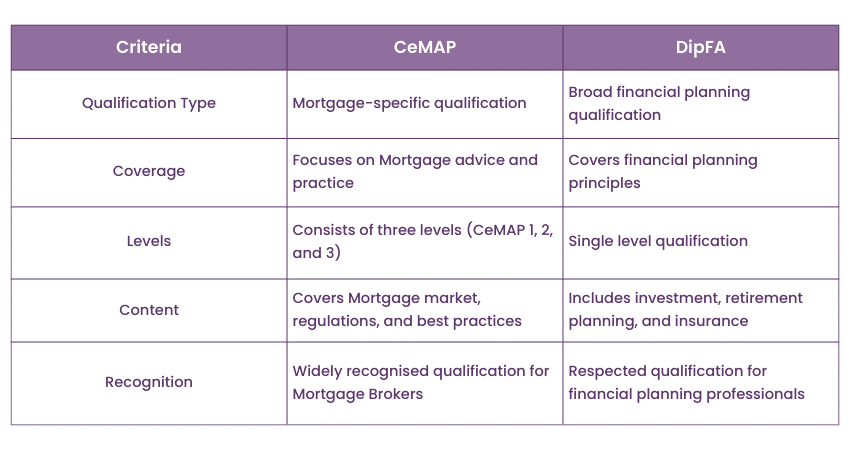
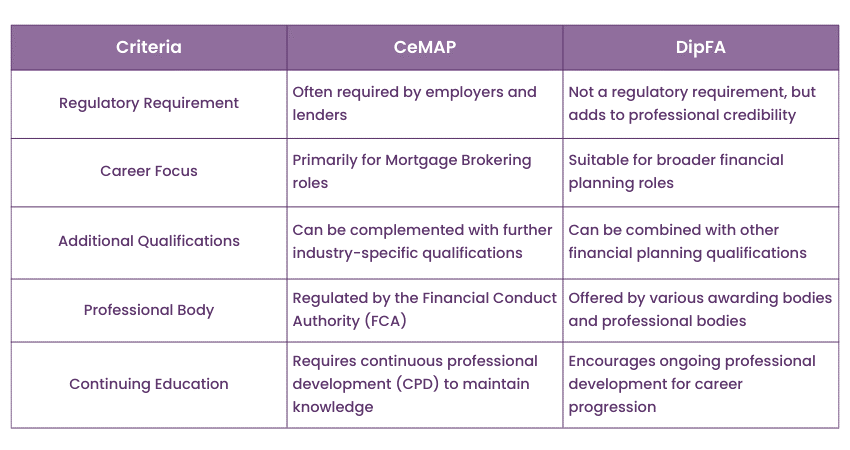
Gain practical experience
While qualifications are important for becoming a Mortgage Broker, gaining practical experience in the Mortgage industry is equally valuable. Practical experience will provide you with firsthand knowledge on the day-to-day operations, challenges, and intricacies involved in the Mortgage Broker profession. By actively seeking opportunities to gain experience and learn from industry experts, you can enhance your skills and Become a Mortgage Broker who is well-equipped to serve clients effectively. Here are some steps that’ll help you gain practical experience:
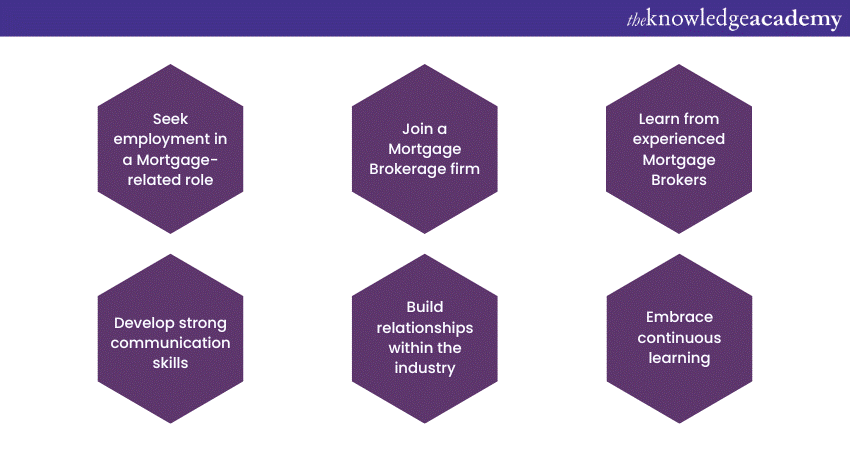
1) Seek employment for a Mortgage-related role: Consider working in a Mortgage-related position to gain practical exposure. Look for opportunities such as a loan processor, Mortgage assistant, or junior Mortgage Broker. These roles will allow you to learn the inner workings of the industry, understand loan applications, and observe the interactions between brokers, lenders, and clients.
2) Join a Mortgage Brokerage firm: Working at a Mortgage Brokerage firm can provide valuable insights into the operations of a successful Mortgage business. It will expose you to different types of clients, lenders, and loan scenarios. Observe how experienced brokers interact with clients, negotiate loan terms, and navigate complex transactions. This hands-on experience will help you develop essential skills and build a strong foundation in the Mortgage industry.
3) Learn from experienced Mortgage Brokers: Seek opportunities to shadow or assist experienced Mortgage Brokers. By observing their work, you can gain insights into their strategies, client interactions, and problem-solving approaches. Learning from seasoned professionals will help you understand the nuances of the profession and gain valuable tips and tricks that are not typically found in textbooks.
4) Develop strong communication skills: Effective communication is key to success for a Mortgage Broker. Practice Active Listening, learn to ask probing questions, and develop the ability to explain complex financial concepts in simple terms. Building strong interpersonal skills will allow you to establish trust with clients and effectively convey information to lenders.
5) Build relationships within the industry: Networking is crucial in the Mortgage industry. Attend industry events, join professional associations, and connect with real estate agents, lenders, and other professionals in the field. Building a strong network will not only provide potential referral opportunities but also allow you to stay informed about market trends and industry developments.
6) Embrace continuous learning: The Mortgage industry is constantly evolving, with new products, regulations, and market conditions. Stay updated with industry news, attend seminars and workshops, and invest in professional development courses. Continuous learning will ensure that you remain competitive and provide the best possible advise and service to your clients.
Establish a professional network
Building a strong professional network is crucial to Become a Mortgage Broker and achieve success in the finance and real estate industry. A robust network can provide valuable connections, referral opportunities, and industry insights. Here are key steps to help you establish a professional network:
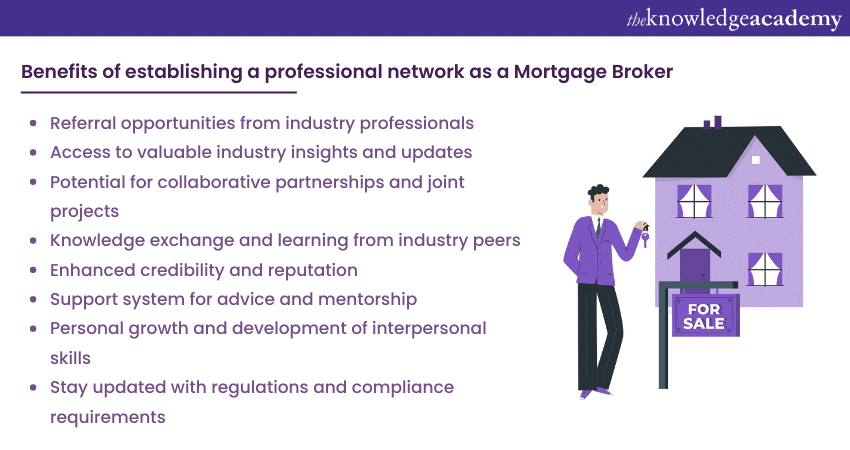
1) Attend industry events and conferences: Participate in Mortgage industry events, conferences, and seminars. These gatherings provide excellent opportunities to meet professionals from various sectors, including real estate agents, lenders, insurers, and fellow Mortgage Brokers. Engage in conversations, exchange contact information, and follow up with individuals you meet to nurture those connections.
2) Join professional associations: Become a member of professional associations dedicated to the Mortgage industry. These associations often offer networking events, educational resources, and forums for knowledge exchange. Some prominent associations in the UK include the Association of Mortgage Intermediaries (AMI) and the National Association of Commercial Finance Brokers (NACFB). Active involvement in these associations will enable you to connect with industry leaders and stay informed about industry developments.
3) Leverage social media: Utilise social media platforms, such as LinkedIn and Twitter, to expand your professional network. Connect with colleagues, mentors, and industry professionals. Engage in relevant discussions, share industry insights, and contribute to online communities. These platforms provide a virtual space to connect with professionals, showcase your expertise, and stay updated with industry news and trends.
4) Collaborate with real estate agents and lenders: Establish strong relationships with real estate agents and lenders. They often work closely with Mortgage Brokers and can refer clients to you. Attend real estate events, meet with local agents, and build trust by demonstrating your expertise and commitment to providing excellent service. Maintain regular communication with lenders to stay informed about their loan products, rates, and any changes in lending policies.
5) Offer value and be a resource: Position yourself as a valuable resource within your network. Share relevant industry updates, insights, and educational content with your connections. Provide helpful advice, answer questions, and offer support when needed. By being a reliable and knowledgeable resource, you will strengthen your professional relationships and gain credibility within the industry.
6) Maintain regular contact: Networking is not a one-time event; it requires consistent effort. Regularly reach out to your contacts to stay connected. This can be through emails, phone calls, or in-person meetings. Remember to reciprocate and offer assistance when you can, as networking is a two-way street.
Obtain necessary licenses and registrations
To operate legally as a Mortgage Broker in the United Kingdom, it is essential to obtain the necessary licenses and registrations.
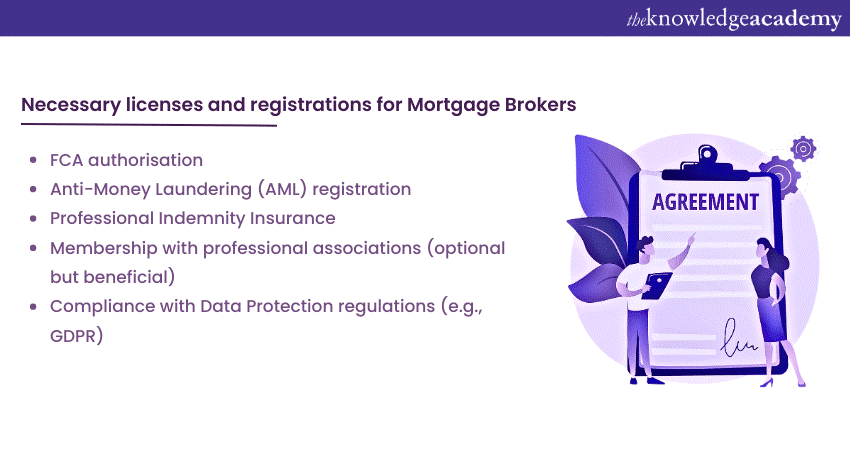
Compliance with regulatory requirements ensures that you meet the standards set by the Financial Conduct Authority (FCA) and instils confidence in your clients as you become a Mortgage Broker. Here are the key steps to obtain the necessary licenses and registrations:
1) Understand FCA regulations: Familiarise yourself with the regulations and guidelines set by the FCA for Mortgage Brokers. The FCA oversees the Mortgage industry and ensures fair practices, consumer protection, and market integrity. Stay updated with the FCA's rules, codes of conduct, and any changes or updates that may impact your role as a Mortgage Broker.
2) Apply for FCA authorisation: Before conducting regulated activities as a Mortgage Broker, you must apply for FCA authorisation. This process involves completing an application form and providing detailed information about your business, including your business structure, operations, and compliance procedures. The FCA will assess your application, conduct background checks, and evaluate your fitness and propriety to operate as a Mortgage Broker.
3) Meet FCA's threshold conditions: The FCA has specific threshold conditions that must be met for authorisation. These conditions include having appropriate resources, maintaining effective risk management systems, and demonstrating competence and capability to carry out regulated activities. Ensure that you have the necessary systems, processes, and qualifications in place to meet these conditions.
4) Financial protection arrangements: As a Mortgage Broker, you may need to consider financial protection arrangements, such as obtaining professional indemnity insurance. This insurance protects you and your clients in the event of errors, omissions, or negligence in your advice or services. Ensure that you meet the FCA's requirements regarding financial protection arrangements.
5) Register with anti-money laundering authorities: Mortgage Brokers are required to register with the appropriate anti-money laundering authorities. This ensures compliance with anti-money laundering regulations and helps prevent illicit activities such as money laundering or unsanctioned terrorism financing Familiarise yourself with the registration process and requirements, which may vary depending on the specific authorities.
6) Maintain compliance and regulatory updates: Once you have obtained the necessary licenses and registrations, it is crucial to maintain compliance with regulatory requirements. Stay informed about changes in regulations, attend relevant training sessions or seminars, and implement robust compliance procedures within your business. Regularly review and update your practices to ensure ongoing compliance with FCA guidelines.
Embark on a rewarding career in financial advice, acquire in-depth knowledge and skills, and earn your Diploma for Financial Advisers (DipFA) through our specialised DipFA training.
Set up your Mortgage Brokerage
Once you have gained the necessary qualifications and experience to become a Mortgage Broker, you may consider setting up your own Mortgage Brokerage. Starting your own business allows you to have greater control over your operations and the opportunity to build a brand that reflects your expertise and values. Here are the key steps to set up your Mortgage Brokerage:
1) Business plan: Begin by creating a comprehensive business plan for your Mortgage Brokerage. Define your target market, identify your Unique Selling Proposition (USP), and outline your marketing and growth strategies. Determine your financial projections, including startup costs, ongoing expenses, and revenue targets. A well-defined business plan will serve as a roadmap for your Brokerage's success.
2) Choose a business structure: Decide on the legal structure for your Mortgage Brokerage. Common options include sole proprietorship, partnership, or Private Limited Company (Pvt. Ltd.). Consult with a legal professional or accountant to determine the most suitable structure for your business, considering factors such as liability, taxation, and future growth plans.
3) Obtain necessary licenses and registrations: Ensure that you have obtained all the required licenses and registrations to operate your Mortgage Brokerage legally. This includes maintaining your FCA authorisation and any other regulatory compliance obligations. Stay updated with the FCA's guidelines and regulations to ensure ongoing compliance with their requirements.
4) Secure professional indemnity insurance: Protect your Mortgage Brokerage and clients by obtaining professional indemnity insurance. This insurance provides coverage in the event of errors, omissions, or negligence in your services. Consult with an insurance provider specialising in professional indemnity insurance to determine the appropriate coverage for your brokerage.
5) Set up operations and infrastructure: Establish the necessary infrastructure to operate your Mortgage Brokerage efficiently. This includes setting up a dedicated office space, acquiring office equipment and technology, and implementing systems for client management, document storage, and communication. Consider investing in Customer Relationship Management (CRM) software to streamline your operations and enhance client service.
6) Develop marketing and branding: Develop a strong brand identity for your Mortgage Brokerage. Create a professional logo, design a user-friendly website, and develop marketing materials such as brochures and business cards. Establish an online presence through social media platforms and create a content strategy to showcase your expertise and attract potential clients.
7) Build a referral network: Establish partnerships and referral networks within the real estate and finance industries. Connect with real estate agents, solicitors, accountants, and other professionals who can refer clients to your Brokerage. Cultivate these relationships by providing excellent service and reciprocal referrals.
8) Compliance and Risk Management: Implement robust compliance and Risk Management procedures within your brokerage. Stay updated with regulatory changes, ensure client data privacy and security, and maintain accurate and thorough records. Regularly review and enhance your compliance practices to mitigate risks and protect your clients and your business.
Continuously educate yourself
In the ever-evolving Mortgage industry, continuous education is essential to stay abreast of industry trends, changes in regulations, and emerging best practices to become a Mortgage Broker. Investing in your ongoing education and professional development can enhance your knowledge, skills, and marketability as a Mortgage Broker. Here are some strategies that’ll help you in continuously educating yourself:
1) Stay informed: Keep yourself updated with industry news and developments. Read industry publications, follow reputable websites, and subscribe to newsletters or blogs focused on the Mortgage industry. Stay informed about changes in regulations, market trends, interest rates, and economic factors that impact the Mortgage market.
2) Attend seminars and workshops: Participate in seminars, workshops, and conferences related to the Mortgage industry. These events provide opportunities to learn from industry experts, gain insights into new products and services, and help in establishing a network with other professionals. Look for events organised by professional associations, industry organisations, and reputable training providers.
3) Pursue Continuing Professional Development (CPD): Engage in Continuing Professional Development programs specific to the Mortgage industry. These programs offer specialised training, workshops, and courses to deepen your knowledge and skills. Seek out CPD opportunities that align with your interests and professional goals, such as Mortgage-specific certifications or advanced training in areas like Risk Management or financial planning.
4) Join industry associations: Become a member of professional associations related to the Mortgage industry, such as the Association of Mortgage Intermediaries (AMI) or the National Association of Commercial Finance Brokers (NACFB). These associations often offer educational resources, webinars, and networking events tailored to Mortgage professionals. Take advantage of these resources to expand your knowledge and stay connected with industry peers.
5) Network and collaborate: Engage in discussions and networking opportunities with fellow Mortgage Brokers, lenders, and industry professionals. Join online forums, LinkedIn groups, or industry-specific communities to exchange ideas, share insights, and learn from others' experiences. Collaborate with professionals in complementary fields, such as real estate agents or financial advisers, to gain diverse perspectives and expand your knowledge base.
6) Embrace technology and automation: Stay updated with technology advancements in the Mortgage industry. Explore digital tools, Mortgage software, and automation solutions that can streamline your processes and improve efficiency. Invest in technology that enables you to better serve your clients and stay competitive in the market.
7) Evaluate and reflect: Regularly evaluate your performance, gain client feedback, and areas for improvement. Reflect on your experiences, successes, and challenges to identify areas where further education or skill development may be beneficial. Seek feedback from clients, mentors, or industry peers to gain insights and identify opportunities for growth.
Provide exceptional customer service
Exceptional customer service is the cornerstone of a successful Mortgage Brokerage. By prioritising the needs and satisfaction of your clients as you Become a Mortgage Adviser, you can build trust, foster long-term relationships, and differentiate yourself from competitors. Here are key strategies to provide exceptional customer service:
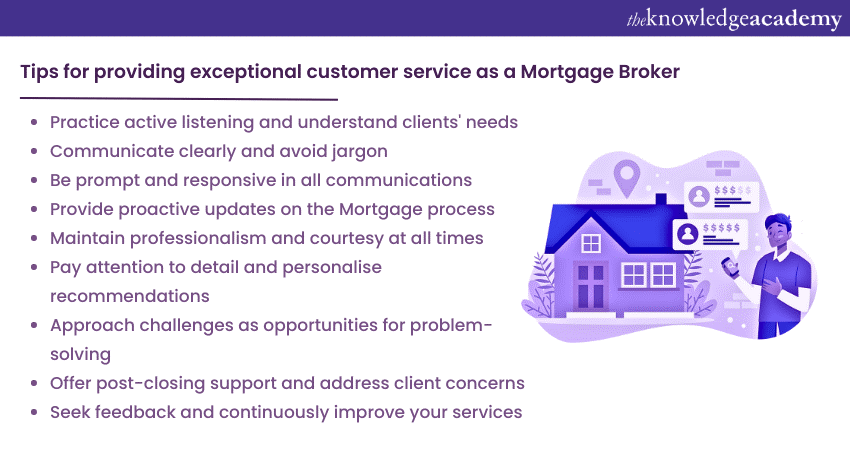
1) Personalised approach: Treat each client as an individual with unique needs and circumstances. Take the time to understand their goals, preferences, and financial situation. Tailor your advice and recommendations to their specific requirements, providing personalised solutions that align with their objectives.
2) Clear and transparent communication: Maintain open and transparent communication with your clients throughout the Mortgage process. Clearly explain the steps involved, the timeline, and any potential challenges. Keep clients informed of progress, respond promptly to their queries, and provide regular updates. Avoid jargon and ensure that clients understand the terms and conditions of their Mortgage agreements.
3) Active engagement and proactive support: Stay actively engaged with your clients, from the initial consultation to the completion of their Mortgage. Be available to answer questions, provide guidance, and offer support at every stage of the process. Proactively anticipate their needs, offer timely advice, and address any concerns or obstacles promptly.
4) Manage expectations: Set realistic expectations with your clients regarding timelines, loan options, and potential challenges. Manage their expectations regarding interest rates, market conditions, and the loan approval process. By providing transparent information and managing expectations, you can foster trust and reduce potential frustrations.
5) Prompt follow-up and aftercare: Demonstrate your commitment to client satisfaction by promptly following up after completing a transaction. Ensure that clients are settled in their new homes and address any post-closing concerns they may have. Stay in touch periodically to provide ongoing support and remind them of your availability for future Mortgage needs.
6) Go the extra mile: Exceed client expectations by going above and beyond. Offer additional resources or educational materials that can help them make informed decisions. Provide recommendations for trusted professionals, such as solicitors or home inspectors, to support their home-buying process. Small gestures and attention to detail can make a significant impact on client satisfaction.
7) Seek feedback and continuous improvement: Regularly seek feedback from your clients to assess their satisfaction levels and identify areas for improvement. Actively listen to their suggestions and concerns and use this feedback to enhance your services and processes. Continuously strive to improve the customer experience and adapt to evolving client needs.
How much does a Mortgage Adviser earn?
The average Mortgage Adviser’s salary in the UK is around £38,316 per annum, according to Glassdoor . Generally, this amount differs slightly according to your experience. However, it can also differ according to your location and your employer. Apart from the salary that is paid to you by your employer, you’re also be eligible for commissions. The rate and amount of commission that you are going to receive depends on your employer.
What are the benefits of becoming a Mortgage Adviser?
There are several benefits of becoming a Mortgage Adviser. They are as follows:
a) The job stability is quite good in the financial sector. Self-growth and professional growth can also be achieved, if you become a Mortgage Adviser.
b) The amount of salary that is paid to Mortgage Advisers increases exponentially over the years and as you gain experiences. You can also earn a good amount of commission, which depends on your employer as well as according to your location.
c) You can have good professional relationships that will help you to improve your potential.
d) You can also be a self-employed Mortgage Adviser. This will help you showcase your entrepreneurial skills to your prospective clients.
e) You can help your local community by helping the residents in the community to secure good housing options.
Conclusion
Learning How to Become a Mortgage Adviser offers a rewarding career in the finance and real estate industry. By following the steps outlined in this blog including obtaining qualifications, gaining practical experience, and providing exceptional customer service, you can establish yourself as a trusted professional. Continuous education and networking will keep you informed about industry trends and foster valuable connections. With dedication and a client-centric approach, you can navigate the complexities of the Mortgage market and make a positive impact on the lives of your clients.
Register now for comprehensive courses and excel in the mortgage industry with CeMAP Training!







 Top Rated Course
Top Rated Course




 If you wish to make any changes to your course, please
If you wish to make any changes to your course, please


